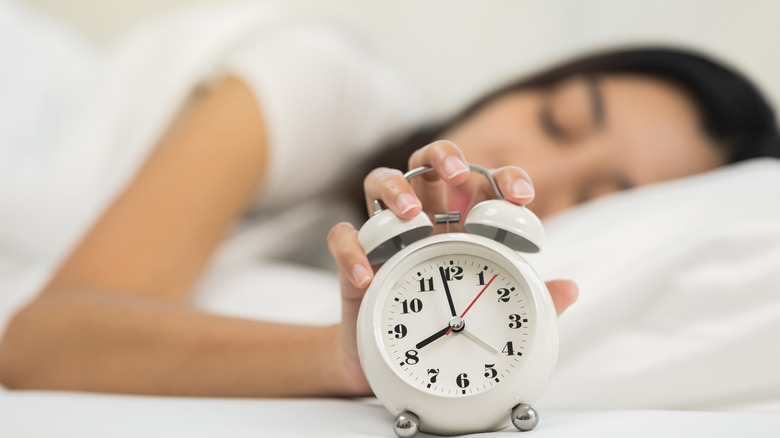Avoid Pressing The Snooze Button If You Want To Combat WFH Burnout
The term burnout has become somewhat of a buzzword since the beginning of the COVID-19 pandemic — and for good reason. There's been burnout from too much screen time, from worrying about loved ones, from continuing on with all our responsibilities throughout crises, and yes, from working at home. Since 2020, many jobs have switched from being 100% in-person to a hybrid model (some days in the office and some at home) or even a fully remote model. Even several years later, the "new normal" isn't always easy, to say the least.
With these types of drastic changes in work life, we need new methods to adapt when it begins to negatively affect our health. It's important to learn how to recognize signs of burnout and take action to address the serious physical and emotional consequences you, a friend, or a family member may be suffering. Luckily, there are clear indicators of the issue and several ways you can address it.
What does burnout look like?
What does burnout really look like? The condition can manifest differently in different people. You may find yourself extremely irritable all the time or experience feelings more akin to depression — loss of interest in activities you usually enjoy, inability to find meaning in life, etc. Newfound insomnia, issues concentrating, and never-ending fatigue are all things that can happen to your body when you're burnt out. Make sure to look out for any gastrointestinal problems and how often you're getting sick, too — immune systems can be affected. Basically, it's no fun.
Unfortunately, though working from home offers a variety of enticing benefits like more time to sleep, no commute, and likely a more comfortable atmosphere, it also puts you at a higher risk for burnout. That's because there's less of a clear "on and off" in your life, and living without that boundary can quickly become too much. The good news is that there are simple changes you can make that will help prevent or alleviate the symptoms.
Here's what you can do
It's best to treat working from home as if you were still working at the office, per NBC. Though keeping up a routine can feel demanding and exhausting, it's actually healthy in the long run and will give you more peace of mind as you navigate this strange new working world. It's true — working from home inevitably requires more self-discipline, but once you turn beneficial practices into daily habits, they're not all that bad.
Start by waking up and getting ready for the day as if you were traveling to work. (Yes, that means not pressing snooze over and over until you're supposed to be on the clock.) Eat a healthy breakfast, put on an outfit that's comfortable but ideally not sweats or pajamas, and if possible, have a room that you go to outside of your bedroom for work. When your workday is over, shut your laptop and leave it until the next day. Healthy working from home is all about these simple routines that help separate your work life from your home life. You've got this!


